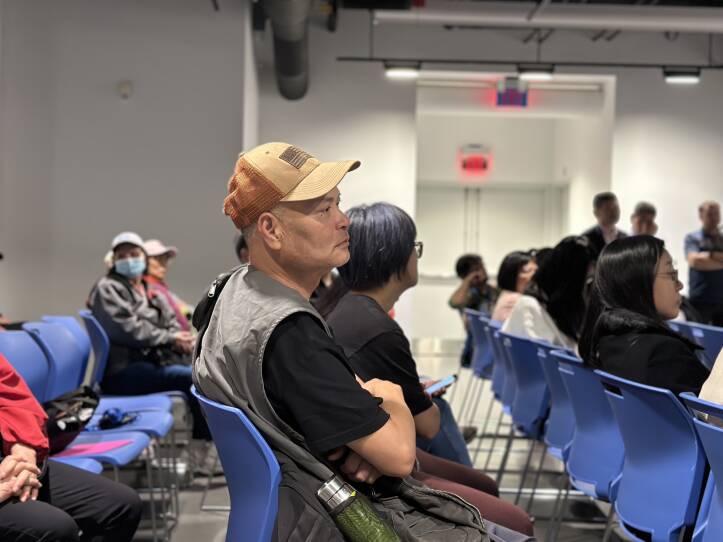Bingxiang Ma says his neighborhood is in peril.
“We know how difficult it was to build the community and form Chinatown, that’s why we have to protect Chinatown. We will always protect Chinatown, because it’s passed down from generation to generation,” said Ma.
The Asian population of Chinatown has been in decline. In 2000, the neighborhood was 69% Asian, according to U.S. Census data. By 2020, the Asian population had dropped to 56%.
Ma, a native of Taishan, China, has seen that population shift while living in Chinatown over the past decade. He says a proposal for a 25-story hotel in the heart of the neighborhood is going to push even more longtime residents out.

At a November meeting convened by the Chinatown Resident Association, residents had the opportunity to share their thoughts with the developers of the hotel project. The room had about 100 people, most of whom were against the plan. They expressed concerns about the potential impacts on cost of living and traffic in the neighborhood, as well as complaints about the man behind the project.
The luxury hotel is being proposed by Chinese developer Sing Ming Chan for 15-25 Harrison Ave., where a five-story building caught fire in 2012 and has since sat vacant. The plan, submitted in August, would be 100 feet taller than current zoning rules allow, according to the Boston Planning Department Agency’s website, meaning it requires public comment and city approval in order to move forward.
The proposal comes shortly after the city drafted a new zoning plan for Chinatown as part of Boston’s effort to preserve and grow the city’s downtown core.
The BPDA released the draft zoning regulations and design guidelines in November that “seek to promote affordable housing, emphasize the significance of small businesses and cultural spaces, and highlight Chinatown’s unique character.” But under the new plan, the area where the new hotel would rise would be zoned as a mixed use “neighborhood and cultural tourism destination” with hotels and entertainment venues.
Lydia Lowe, the executive director of the Chinatown Community Land Trust, has been deeply involved in the city’s planning process and says there have been mixed responses.
“The community feels like the city has kind of been listening to what the community is saying, but there are certain things about the height and affordability levels that we’re concerned about,” she said.
The hotel developer is no stranger to Chinatown. Chan also owns a residential building on Oxford Street. In an Oct. 29 letter to Mayor Michelle Wu and city councilors, the Oxford Street Tenant Association wrote that they doubted his ability to properly manage the hotel because “he’s not a responsible landlord. In our building, we continue to have rodents, cockroaches and leaky appliances, with Mr. Chan unresponsive to our maintenance requests.”
Chan did not respond to multiple requests from GBH News to discuss the hotel project and the neighbors’ concerns.
“We especially need housing that is affordable for new immigrants. These new buildings are mostly for rich people.”Ming Hong Yu
During the public comment period for the hotel proposal, more than 15 people wrote letters that detailed their concerns about the possibility of a luxury hotel coming to their neighborhood.
“A hotel is only for visitors, not for local residents, and with less and less available land, we especially need housing that is affordable for new immigrants. These new buildings are mostly for rich people,” Ming Hong Yu wrote.
“Once 25 stories are approved, this will affect other buildings as well and make gentrification and increasing rents worse in the privately owned row houses like where I live,” wrote Cuimei Zhu. “That is why we are now living three households in one apartment and have been on the waiting list for elderly affordable housing for nine years.”
The Asian Community Development Corporation is a nonprofit that creates affordable housing and provides housing and financial counseling in Chinatown, Malden and Quincy. In a letter to the city, the group said the hotel plan raises several major issues: the project exceeds current zoning limits; it contributes to gentrification and displacement; there’s a questionable need for a hotel in Chinatown.
In addition, the group cautioned of traffic and pedestrian concerns. The hotel proposal does not include a garage, making the search for parking more difficult for visitors and residents alike, and the site is adjacent to a busy pedestrian corner.
City Councillor Ed Flynn, who represents the district, wrote to the BPDA asking for an extension of the comment period on the project proposal which was originally supposed to close in November. “There needs to be more dialogue with our community” about the hotel, he said.
The extension was granted until Dec. 30. Now, those comments will be reviewed by Boston’s Planning Department as the board considers whether to grant an exception to the zoning rules and approve the plan, or send it back to the developer for revisions.
Ma said “Chinatown is only a small part of Boston, and we would not allow it to be taken away or break us apart.” With a new luxury hotel in its commercial center, he worries “Chinatown will become smaller and smaller.”





